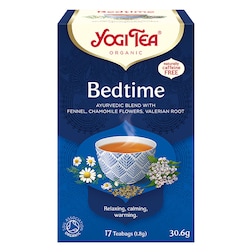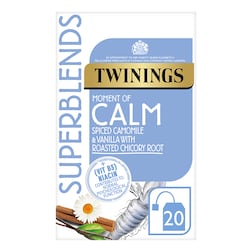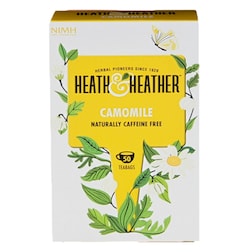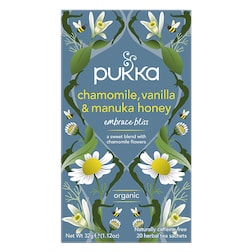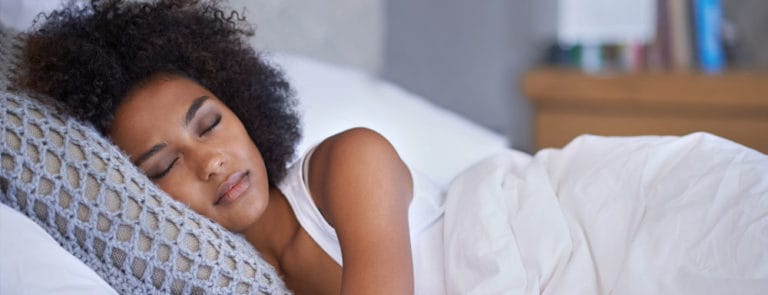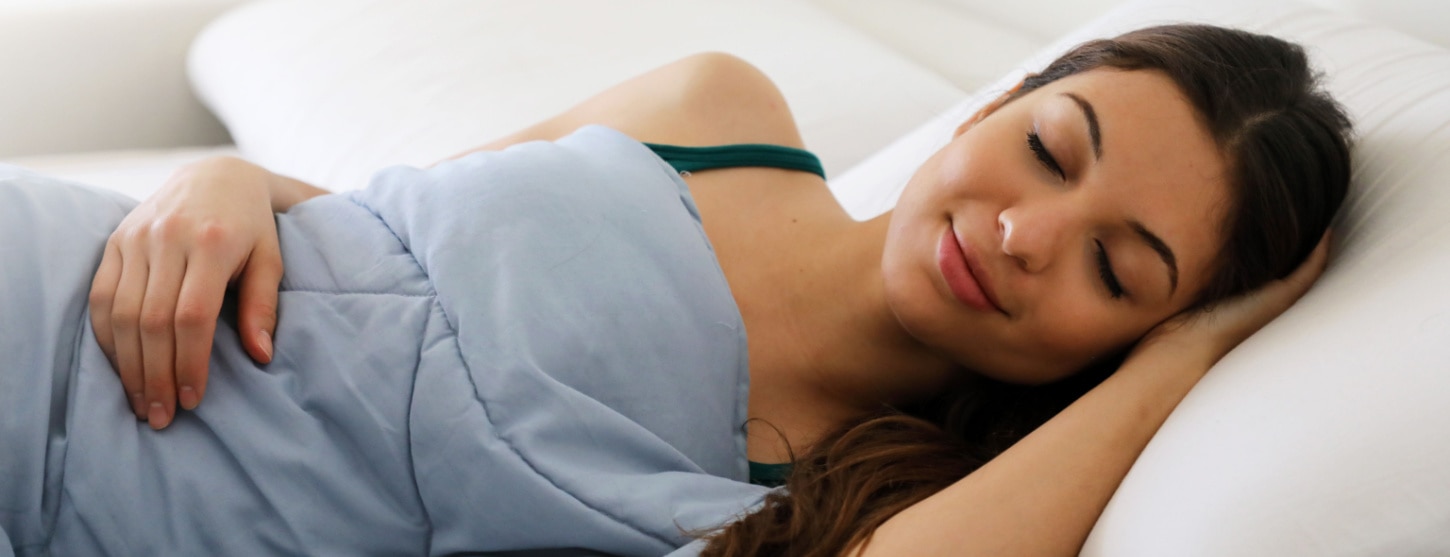15% off £25 OR 20% off £35
7 of the best teas to help you sleep 2023
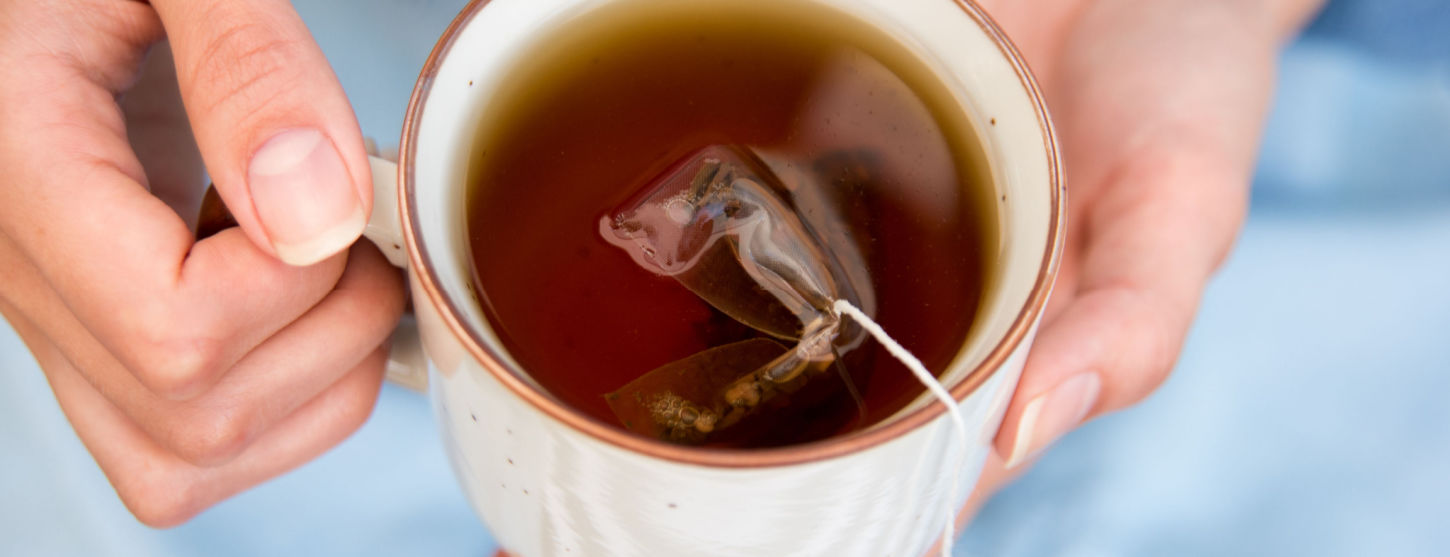
Our top 3 picks
Vegan
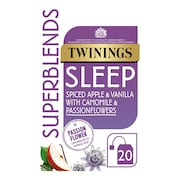
Twinings
Twinings Superblends Sleep 20 Tea Bags
£3.50
Organic
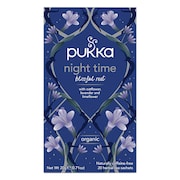
Pukka
Pukka Night Time Tea 20 Tea Bags
£4.75
Vegan
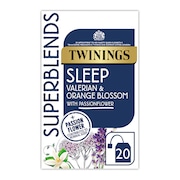
Twinings
Twinings Superblends Sleep Valerian and Orange Blossom 20 Tea Bags
£3.50
According to the NHS, you should be getting between 7 to 9 hours a night.1 But it’s not always that easy.
It’s natural to find it difficult to switch off after a day staring at a computer screen all day or having the stresses of work and family life.
So, it’s little wonder that many of us reach for ways to overcome our lack of sleep by trying anything that is on offer to us.
In this article, we’re going to be looking at teas, perhaps more specifically teas to help you prepare for a peaceful night.
A nighttime tea may seem like an odd concept, but keep with us and we’ll stew over the best teas, providing you with everything you need to know about nighttime teas.
In this article, we will cover:
What are bedtime teas?
Might seem like we’re pointing out the obvious here, but the thought is that teas for bedtime are teas that will help you get some much-needed Z’s.
Now, a tea before bed may seem a bit like a crazy idea.
But unlike the tea you would usually go for, bedtime teas do not contain any caffeine.
In fact, many bedtime teas contain the same ingredients that you would find in many supplements – such as chamomile.
How can tea help you relax?
Most of us know about the trick of drinking a warm milky drink before bed, but what about tea? Is it possible that it can help in the relaxation stakes too?
As we all know, normal black tea contains caffeine, which is a stimulant that’s also found in coffee. Because of its stimulating properties, caffeine isn’t something we’re advised to consume before we go to bed. This is due to the fact it can stimulate our brain and make us more alert, which is the last thing we want to be when we’re trying to wind down.2
However, tea doesn’t contain as much caffeine as coffee does. There’s reportedly 11mg per 100g of caffeine in tea. In comparison, coffee contains 37mg per 100g, which is a bit of a difference.3,4 What’s more, tea also happens to contain an amino acid called theanine.
It’s also been linked to boosting our cognitive abilities, e.g. memory and concentration levels, too.5 Different levels of l-theanine can be found in different tea, with green tea containing the highest levels of it.
Overall, the combination of caffeine and l-theanine working together can make us feel more relaxed, as well as the process of enjoying a nice hot cup of tea, can have an effect on our mind and body.
Summary
- Black tea contains lower levels of caffeine than coffee – 25mg less per 100g, making it less of a stimulant
- It also contains the amino acid, l-theanine, which has been found can help us relax better
- Green tea contains the most l-theanine
Most of us know about the trick of drinking a warm milky drink before bed, but what about tea? Is it possible that it can help in the relaxation stakes too?
As we all know, normal black tea contains caffeine, which is a stimulant that’s also found in coffee. Because of its stimulating properties, caffeine isn’t something we’re advised to consume before we go to bed.
This is due to the fact it can stimulate our brain and make us more alert, which is the last thing we want to be when we’re trying to wind down.2
However, tea doesn’t contain as much caffeine as coffee does. There’s reportedly 11mg per 100g of caffeine in tea. In comparison, coffee contains 37mg per 100g, which is a bit of a difference.3,4
What’s more, tea also happens to contain an amino acid called theanine.
It’s also been linked to boosting our cognitive abilities, e.g. memory and concentration levels, too.5
Different levels of l-theanine can be found in different tea, with green tea containing the highest levels of it.
Overall, the combination of caffeine and l-theanine working together can make us feel more relaxed, as well as the process of enjoying a nice hot cup of tea, can have an effect on our mind and body.
Summary
- Black tea contains lower levels of caffeine than coffee – 25mg less per 100g, making it less of a stimulant
- It also contains the amino acid, l-theanine, which has been found can help us relax better
- Green tea contains the most l-theanine
How did we choose the best teas for bedtime?
To help us put together our list, we considered five factors that would help us decide which teas deserved to make our list of the best night time teas the UK has to offer, these include:
- Ingredients
It’s impossible to make a good bedtime tea without the right elements.
That’s why we only selected caffeine-free teas, of course.
But we have also looked at the specifics of each to help you summon the sandman.
- Variety
It’s possible to pick up a box of caffeine-free tea from any supermarket, which is why we’ve tried to go a little bit further than just your average box of chamomile.
- Customer reviews
We have taken on the views of our customers so we can offer you the most tried and tested teas available on the market.
- Quality
We researched our brands so we can offer the most established night time teas on the market.
We checked whether brands sourced their ingredients and processed their teas responsibly.
- Ease of purchase
We’ve ensured that all of these brands are available via the Holland & Barrett online shop or at one of our Holland & Barret stores, so you can find them easily and purchase without too much hard work.
- Great Taste Winner 2018
- Added botanicals
- Suitable for vegans
- Caffeine-free
Alibxox123 – Super chilled and sleepy – 5/5 stars
- Plastic-free tea bags
- Caffeine-free
- Suitable for vegans
- Caffeine-free
- Contains added Vitamin B3
- Suitable for vegetarians
- Caffeine-free
- No artificial colours, preservatives or flavouring
- Suitable for vegans
- Caffeine-free
- Suitable for vegans
- Added passionflower
- Caffeine-free
- Organic
- Suitable for vegetarians
- Compostable tea bags and recyclable packaging
Summary: the best teas for relaxation
Lots of herbal teas have been connected, and proven, to help us ease into our bedtime routine. But generally speaking, which are the best to look out for?
We’ve listed five of them below:
- Green tea
As we mentioned up earlier, green tea contains plenty of l-theanine, which can help give its sleep-inducing effects. This is down to the fact it works by encouraging our brains to switch off and relax.6 But not one for people avoiding caffeine.
- Chamomile tea
Chamomile is widely reported to help with relaxation and sleep. A review of research published in 2019 concluded that chamomile can significantly improve sleep quality.7
As for why chamomile may help with sleep and relaxation, it contains an antioxidant called apigenin, that binds to receptors within your brain that are responsible for making us feel sleepy.
Because of this, it’s renowned for being a mild tranquiliser, which has been researched extensively.8,9
- Peppermint tea
Peppermint is naturally caffeine-free, making it a popular drink for relaxation.
In addition to this, research has found it also has muscle relaxing properties, which may help with relaxation before bedtime.10
However, evidence of peppermint tea’s ability to help with sleep is extremely limited.11
- Valerian root tea
Valerian root, a herb that’s native to Asia and Europe, contains gamma-aminobutyric acid (GABA), one of the main neurotransmitters responsible for regulating our sleep. Research has found that increasing our GABA levels can have a sedative effect on our body.12
Summary
- Numerous herbal teas have been linked to helping promote relaxation. They include green, chamomile, peppermint, valerian root and rooibos tea
- Rooibos tea is naturally caffeine-free, while valerian roots contain a neurotransmitter responsible for regulating sleep
- Peppermint tea may help with muscle relaxation, while chamomile tea has been found to improve sleep quality
Are there any side effects to sleep teas?
Generally speaking, sipping a herbal tea before bed is safe.
Chamomile is listed as a safe, natural ingredient in most sleep teas.
However, you might want to be a bit cautious of teas that contain valerian may cause some side effects such as:
- Headaches
- Dizziness
- Upset stomach
If you have any concerns about the effects of sleep teas, please speak to your GP or a health professional.
A final few words about bedtime tea
Next time you need some help with night-time relaxation, you may want to reach out for one of the bedtime tea blends above, which have been tried-and-tested and highly recommended by plenty of our customers.
Bear in mind that what works for one person, may not work for another. But with so many different relaxation teas to choose from, we’re sure you’ll find something that you love the taste of and will help you with your bedtime routines.
Enjoy trying all of the different blends and best of luck with finding the best tea for you.
Last updated: 1 January 2023
- https://www.nhs.uk/conditions/insomnia/
- https://www.terrycralle.com/why-does-tea-make-me-sleepy/
- https://fdc.nal.usda.gov/fdc-app.html#/food-details/174144/nutrients
- https://fdc.nal.usda.gov/fdc-app.html#/food-details/171881/nutrients
- https://pubmed.ncbi.nlm.nih.gov/24051231/
- https://pubmed.ncbi.nlm.nih.gov/24051231/
- https://pubmed.ncbi.nlm.nih.gov/31006899/
- https://www.ncbi.nlm.nih.gov/pmc/articles/PMC2995283
- https://pubmed.ncbi.nlm.nih.gov/16767798/
- https://pubmed.ncbi.nlm.nih.gov/17913072/
- https://pubmed.ncbi.nlm.nih.gov/24022885/
- https://www.frontiersin.org/articles/10.3389/fnins.2020.00923/full


